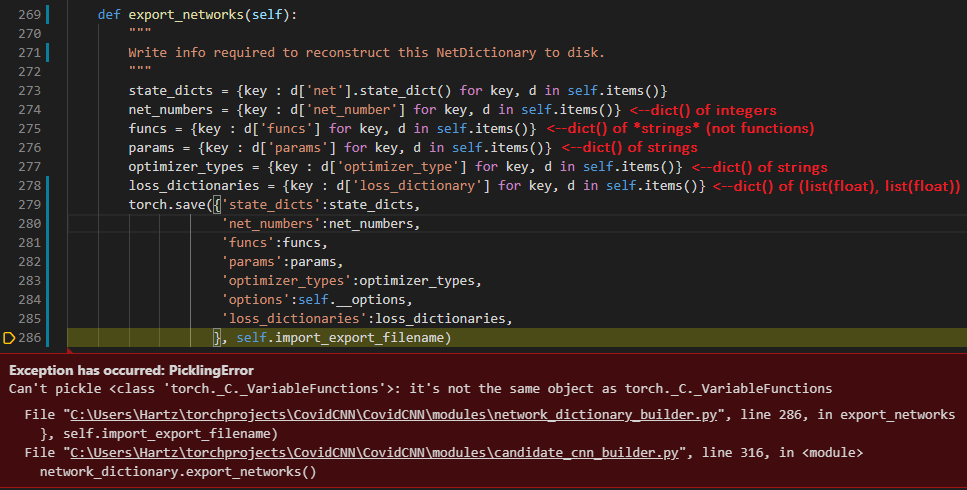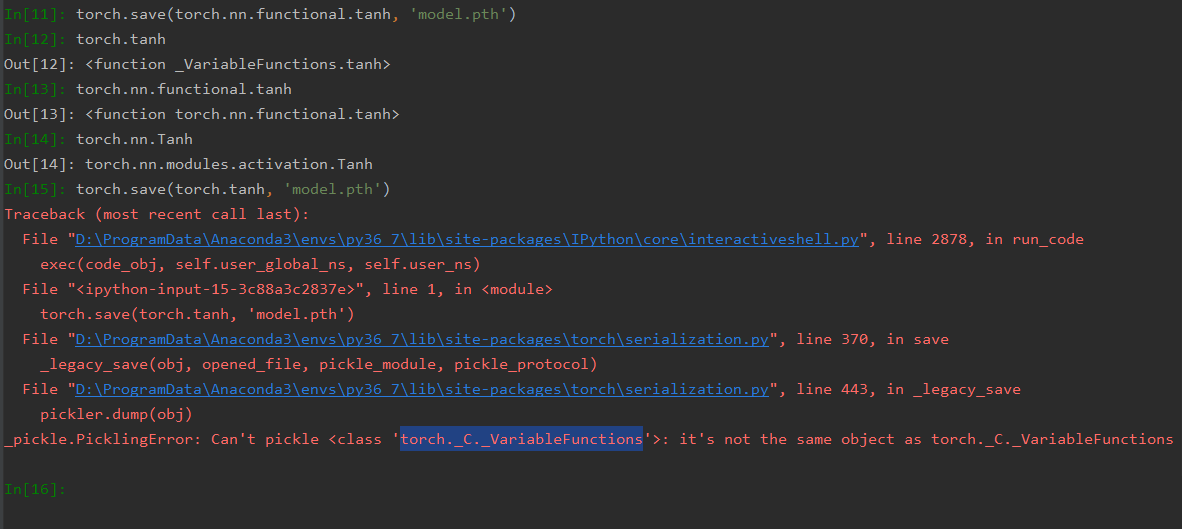I’ve created a module that contains two classes, a NetDictionary class that inherits from dict(), and a Net class that inherits from nn.Module. The NetDictionary constructor arguments and doc string are shown below:
def __init__(self, network_count, test_tensor, total_labels, import_export_filename, **kwargs):
"""
Initialize a dictionary of randomly structured CNNs to test various network configurations.
args: network_count: number of networks to generate
test_tensor: a tensor that can be used to construct network layers
total_labels: the number of labels being predicted for the networks
import_export_filename: if file exists on initialization, the information in the
file will be used to reconstruct a prior network.
kwargs: optimizers: list of tuples of form (eval strings for optimizer creation, label)
first_conv_layer_depth
max_conv_layers
min_conv_layers
max_kernel_size
min_kernel_size
max_out_channels
min_out_channels
init_linear_out_features
linear_feature_deadband
max_layer_divisor
min_layer_divisor
"""
When initialized, the NetDictionary class builds a randomized list of eval strings corresponding to module functions and a randomized list of eval strings for the parameterizations of those functions subject to the constraints in kwargs and passes that information, along with the test_tensor, to the Net constructor. The Net constructor then builds an nn.ModuleList and a list of nn.functional calls for use in the forward layer using the python eval() function, and the resulting network is saved in the ‘dict’ of NetDictionary. This process is repeated ‘network_count*(len(optimizers))’ times (see doc string above).
Perhaps surprisingly, all of that works like a charm. I’ve generated a set of 300 randomized networks with various optimizers and trained and validated against my dataset, recording a loss dictionary along the way. The problem comes in AFTER the training and validation when I call a function in NetDictionary that attempts to call torch.save() on a dictionary containing the state_dicts() of every Net in NetDictionary along with some additional objects containing nothing but native python types as shown here alongside the error:
I’ve tried just exporting the dict back to my main python script and pickling there as well, but the same issue occurs. I’m currently working around it, but in the long run, I’ll HAVE to be able to save these networks to disk. Any advice would be appreciated.
NOTE: I’m not a python expert so any advice for providing additional stack trace or other debug information would be appreciated as well. I’m using vscode via anaconda and an export of my environment is shown below for reference. The source code for the module can be found here.
name: torch
channels:
- defaults
dependencies:
- _pytorch_select=1.1.0=cpu
- astroid=2.4.2=py37_0
- attrs=19.3.0=py_0
- backcall=0.1.0=py37_0
- blas=1.0=mkl
- bleach=3.1.4=py_0
- ca-certificates=2020.6.24=0
- certifi=2020.6.20=py37_0
- cffi=1.14.0=py37h7a1dbc1_0
- colorama=0.4.3=py_0
- console_shortcut=0.1.1=4
- cycler=0.10.0=py37_0
- decorator=4.4.2=py_0
- defusedxml=0.6.0=py_0
- entrypoints=0.3=py37_0
- freetype=2.9.1=ha9979f8_1
- icc_rt=2019.0.0=h0cc432a_1
- icu=58.2=ha925a31_3
- imageio=2.8.0=py_0
- importlib_metadata=1.5.0=py37_0
- intel-openmp=2020.1=216
- ipykernel=5.1.4=py37h39e3cac_0
- ipython=7.13.0=py37h5ca1d4c_0
- ipython_genutils=0.2.0=py37_0
- ipywidgets=7.5.1=py_0
- isort=4.3.21=py37_0
- jedi=0.17.0=py37_0
- jinja2=2.11.2=py_0
- joblib=0.15.1=py_0
- jpeg=9b=hb83a4c4_2
- jsonschema=3.2.0=py37_0
- jupyter_client=6.1.3=py_0
- jupyter_core=4.6.3=py37_0
- kiwisolver=1.2.0=py37h74a9793_0
- lazy-object-proxy=1.4.3=py37he774522_0
- libpng=1.6.37=h2a8f88b_0
- libsodium=1.0.16=h9d3ae62_0
- libtiff=4.1.0=h56a325e_0
- m2w64-gcc-libgfortran=5.3.0=6
- m2w64-gcc-libs=5.3.0=7
- m2w64-gcc-libs-core=5.3.0=7
- m2w64-gmp=6.1.0=2
- m2w64-libwinpthread-git=5.0.0.4634.697f757=2
- markupsafe=1.1.1=py37he774522_0
- matplotlib=3.1.3=py37_0
- matplotlib-base=3.1.3=py37h64f37c6_0
- mccabe=0.6.1=py37_1
- mistune=0.8.4=py37he774522_0
- mkl=2020.1=216
- mkl-service=2.3.0=py37hb782905_0
- mkl_fft=1.0.15=py37h14836fe_0
- mkl_random=1.1.0=py37h675688f_0
- msys2-conda-epoch=20160418=1
- nbconvert=5.6.1=py37_0
- nbformat=5.0.6=py_0
- ninja=1.9.0=py37h74a9793_0
- notebook=6.0.3=py37_0
- numpy=1.18.1=py37h93ca92e_0
- numpy-base=1.18.1=py37hc3f5095_1
- olefile=0.46=py37_0
- openssl=1.1.1g=he774522_0
- pandas=1.0.1=py37h47e9c7a_0
- pandoc=2.2.3.2=0
- pandocfilters=1.4.2=py37_1
- parso=0.7.0=py_0
- pickleshare=0.7.5=py37_0
- pillow=7.0.0=py37hcc1f983_0
- prometheus_client=0.7.1=py_0
- prompt-toolkit=3.0.4=py_0
- prompt_toolkit=3.0.4=0
- pycparser=2.20=py_0
- pygments=2.6.1=py_0
- pylint=2.5.3=py37_0
- pyodbc=4.0.30=py37ha925a31_0
- pyparsing=2.4.7=py_0
- pyqt=5.9.2=py37h6538335_2
- pyrsistent=0.16.0=py37he774522_0
- python=3.7.6=h60c2a47_2
- python-dateutil=2.8.1=py_0
- pytz=2020.1=py_0
- pywin32=227=py37he774522_1
- pywinpty=0.5.7=py37_0
- pyzmq=18.1.1=py37ha925a31_0
- qt=5.9.7=vc14h73c81de_0
- scikit-learn=0.22.1=py37h6288b17_0
- scipy=1.4.1=py37h9439919_0
- seaborn=0.10.0=py_0
- send2trash=1.5.0=py37_0
- setuptools=46.4.0=py37_0
- sip=4.19.8=py37h6538335_0
- six=1.14.0=py37_0
- sqlite=3.31.1=h2a8f88b_1
- terminado=0.8.3=py37_0
- testpath=0.4.4=py_0
- tk=8.6.8=hfa6e2cd_0
- toml=0.10.1=py_0
- tornado=6.0.4=py37he774522_1
- tqdm=4.46.0=py_0
- traitlets=4.3.3=py37_0
- typed-ast=1.4.1=py37he774522_0
- vc=14.1=h0510ff6_4
- vs2015_runtime=14.16.27012=hf0eaf9b_2
- wcwidth=0.1.9=py_0
- webencodings=0.5.1=py37_1
- wheel=0.34.2=py37_0
- widgetsnbextension=3.5.1=py37_0
- wincertstore=0.2=py37_0
- winpty=0.4.3=4
- wrapt=1.11.2=py37he774522_0
- xz=5.2.5=h62dcd97_0
- zeromq=4.3.1=h33f27b4_3
- zipp=3.1.0=py_0
- zlib=1.2.11=h62dcd97_4
- zstd=1.3.7=h508b16e_0
- pip:
- future==0.18.2
- hamiltorch==0.3.1.dev1
- pip==20.1.1
- termcolor==1.1.0
- torch==1.5.0+cpu
- torchsummary==1.5.1
- torchvision==0.6.0+cpu
Thanks,
Sam H.




